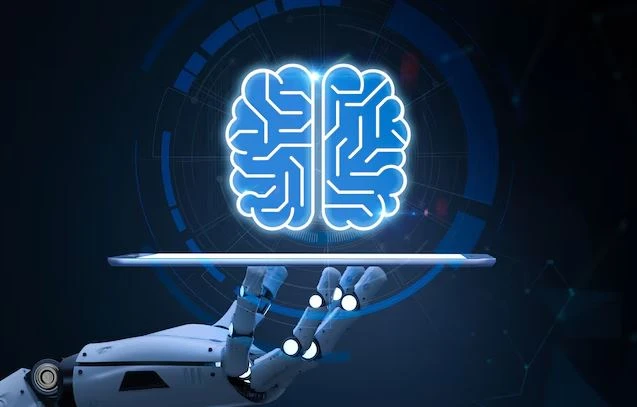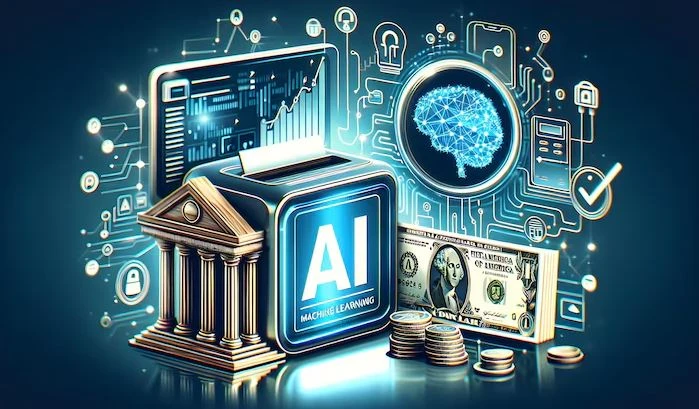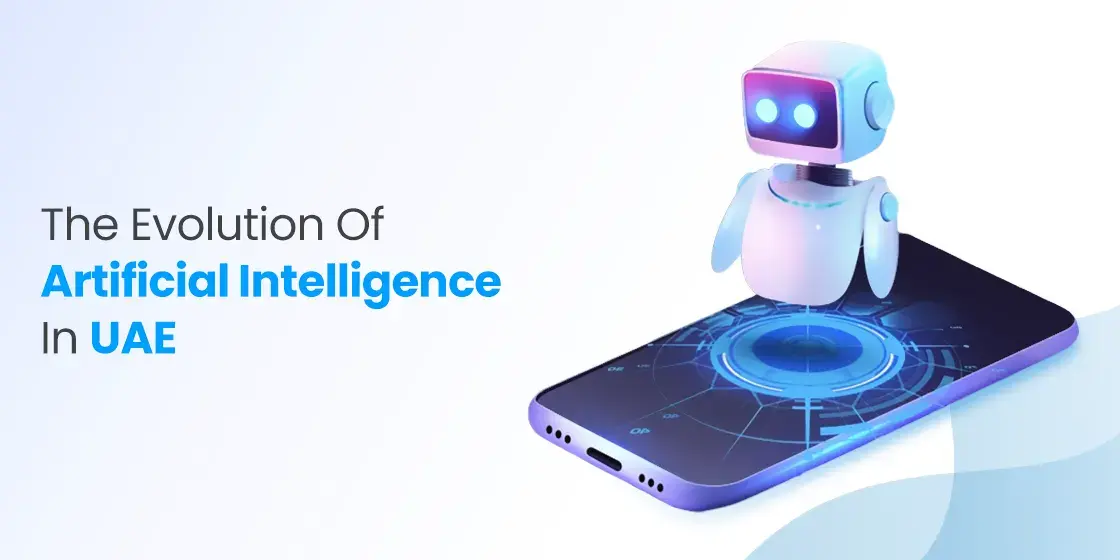Table of Content
Know How Artificial Intelligence is Revolutionizing the Banking Sector
The impact of artificial intelligence can be seen across various industries. It has changed the way we manage tasks, making things way more simpler than ever. Talking about the impact of AI in banking, it has certainly made huge strides in that sector lately. Many banks are now using AI-powered software products to streamline their routine operations. Built by reputed software development services, these products have the tendency to automate several operations, allowing banks to function easily without worrying about managing the overhead processes.
With the help of AI-powered solutions, banks are now been able to facilitate customers quickly. There are several banking apps working in the market that are built with the power of AI. Apart from making transaction process quicker, AI also helps to make online banking secure than ever. It is one of the key advantages of AI that makes its utility important for banks. Though people are not aware how AI functions at the backend, but their significance for the developers and banks remains unprecedented.
In this blog, we will discuss in detail the importance of AI in banking. We will let you know how the landscape of banking has been transformed with the help of artificial intelligence. It is a technology that has brought automation, allowing businesses to simplify various critical tasks efficiently. Let’s start from the basics understanding how AI became a revolutionary technology, and why its adoption in the world is becoming quicker day by day.
Significance of Artificial Intelligence

Artificial Intelligence (AI) has become a crucial technology today because of its ability to process vast amounts of data quickly and efficiently. In an era where data is generated at an unprecedented rate, AI’s capacity to analyze, learn from, and make decisions based on this data is invaluable. Businesses across various industries rely on AI to gain insights, optimize operations, and deliver personalized experiences. For instance, AI-driven analytics help companies understand consumer behavior, giving them a competitive edge in an increasingly data-driven world.
AI’s importance also stems from its ability to automate routine tasks, freeing up human workers to focus on more complex and creative endeavors. From manufacturing and logistics to customer service and healthcare, AI-powered automation has revolutionized how businesses operate. In manufacturing, AI-driven robots and systems can perform repetitive tasks with precision, reducing errors and increasing efficiency. In customer service, AI chatbots handle routine inquiries, providing quick responses and improving customer satisfaction.
Furthermore, AI plays a critical role in addressing some of the world’s most pressing challenges. In healthcare, AI is used to diagnose diseases, and even predict outbreaks. In environmental science, AI helps monitor deforestation, track wildlife populations, and model climate change scenarios, enabling better conservation efforts. In security, AI is employed for threat detection and response, safeguarding both physical and digital spaces. As these challenges grow in complexity, AI’s ability to analyze data and propose solutions will continue to be essential in driving progress and ensuring a sustainable future.
Quick Adoption of AI Across Industries

AI is being rapidly adopted across multiple industries due to its ability to enhance efficiency and productivity. In sectors like manufacturing, logistics, and healthcare, AI-powered automation and data analysis allow businesses to streamline operations. For example, AI algorithms can process vast amounts of data much faster than humans, identifying patterns and insights that drive more informed decision-making. This efficiency translates to a competitive advantage, as companies that leverage AI can innovate faster and respond more quickly to market changes.
Another driving factor for AI adoption is its ability to deliver personalized experiences at scale. In industries such as retail, finance, and entertainment, AI enables companies to tailor products, services, and content to individual preferences. By analyzing consumer behavior and preferences, AI can predict future needs and offer personalized recommendations, which improves customer satisfaction and loyalty. This level of customization was previously unattainable and is now crucial in an increasingly digital and consumer-driven marketplace.
Finally, the rapid advancements in AI technology and the increasing availability of AI tools and platforms have lowered barriers to entry. Cloud-based AI services allow companies to integrate AI capabilities without needing to invest in expensive infrastructure or specialized talent. As AI becomes more user-friendly and integrated into business processes, industries are more inclined to adopt it to stay competitive. This widespread adoption is also fueled by the recognition that AI is not just a trend but a transformative force reshaping how industries operate.
What is AI in Banking?

AI in banking refers to the integration of artificial intelligence technologies into various banking operations to enhance efficiency, improve customer service, and manage risk. Banks are leveraging AI to automate routine tasks such as transaction processing, data entry, and fraud detection, significantly reducing the need for manual intervention. AI-powered chatbots and virtual assistants are also used to handle customer inquiries, provide account information, and offer financial advice, delivering a more personalized and responsive customer experience.
Another key application of AI in banking is in risk management and fraud detection. AI algorithms can analyze vast amounts of transaction data in real-time to identify unusual patterns or behaviors that may indicate fraudulent activities. These systems can detect and respond to threats much faster than traditional methods, helping banks to mitigate risks more effectively. AI is also used in credit scoring and lending, where it evaluates a borrower’s creditworthiness by analyzing a broader set of data points, such as transaction history and social behavior.
Furthermore, AI is transforming the way banks interact with their customers by enabling more personalized and predictive services. For example, AI can analyze a customer’s financial behavior to offer tailored financial products, investment advice, or savings strategies. Predictive analytics powered by AI helps banks anticipate customer needs and deliver targeted marketing, improving customer retention and satisfaction. Additionally, AI-driven insights enable banks to optimize their product offerings, enhance customer engagement, and build stronger, data-driven relationships with their clients.
Core Applications of AI in Banking

With the help of AI, different banking operations can be simplified perfectly. It is a futuristic technology that allows to automate various critical tasks easily. If you do not know how AI in banking works, take a look at the key applications of the technology defined below.
Customer Experience
Customers today are increasingly seeking superior experiences and greater convenience in their interactions with financial institutions. In a competitive marketplace, consumers expect seamless, personalized services that cater to their individual needs and preferences. They desire faster, more efficient transactions, easy access to financial products, and instant support when issues arise. As a result, banks and financial service providers are under constant pressure to innovate and improve their offerings to meet these evolving customer expectations.
The integration of artificial intelligence (AI) into banking apps and financial services plays a pivotal role in enhancing the overall consumer experience. AI technologies, such as chatbots, virtual assistants, and predictive analytics, allow banks to offer more personalized and responsive services. For example, AI can analyze a customer’s financial behavior and preferences to suggest tailored financial products or provide personalized financial advice. Additionally, AI-driven automation reduces wait times for services, speeds up transaction processing, and ensures that customers can access support around the clock.
Moreover, AI in banking is not just about enhancing convenience; it also enables a higher level of customization and proactive service. By leveraging data analytics and machine learning, financial institutions can anticipate customer needs and offer solutions before issues arise. This proactive approach not only makes banking more convenient but also builds trust and loyalty. As AI continues to evolve, its integration into banking and finance is expected to deepen, driving further enhancements in customer experience.
Cybersecurity
Banks can use AI to strengthen cybersecurity by implementing advanced threat detection systems. AI-powered threat detection systems are capable of analyzing vast amounts of data in real-time, identifying patterns and anomalies that could indicate a cyberattack. These systems can detect unusual behaviors, such as unauthorized access attempts or abnormal transaction patterns, which traditional security measures might miss. By continuously learning from new data, AI algorithms improve over time, becoming more effective at identifying and mitigating emerging threats.
In addition to threat detection, AI can automate responses to cybersecurity incidents. When an AI system detects suspicious activity, it can immediately trigger a series of pre-defined actions, such as isolating affected systems, alerting security teams, or even neutralizing the threat. This rapid response capability is crucial in minimizing the impact of cyberattacks, as it prevents them from spreading and causing further damage. Automated response systems also help in managing the sheer volume of security alerts, enabling banks to focus on more complex and strategic security challenges.
Furthermore, AI enhances authentication and access control processes, which are critical components of cybersecurity in banking. By analyzing behavioral biometrics, such as typing patterns, mouse movements, and login habits, AI can create more secure and personalized authentication methods. These systems can detect if an account is being accessed by an unauthorized user, even if they have the correct login credentials. AI can also be used to implement multi-factor authentication systems that adapt based on the level of risk associated with a particular transaction or login attempt.
Credit Marking
Banks have increasingly begun integrating AI-based systems into their operations to make more informed, secure, and financially advantageous decisions regarding loans and credit. These advanced AI technologies allow banks to analyze a much wider range of data points than traditional methods, offering deeper insights into a borrower’s financial health and behavior. By utilizing machine learning algorithms, banks can now predict credit risk with greater accuracy, identifying potential red flags or opportunities that might be missed by conventional analysis.
Traditionally, many digital banking apps like Mashreq Neobiz have relied heavily on a narrow set of criteria to assess creditworthiness, primarily focusing on an individual’s or a company’s credit history, credit scores, and customer references. While these metrics provide valuable information, they can sometimes offer an incomplete picture of a borrower’s ability to repay a loan. For instance, credit scores may not fully reflect recent financial behaviors or the unique circumstances of a borrower, particularly for those who have limited credit history or who are new to the credit market.
AI-based systems are addressing these limitations by incorporating a broader spectrum of data into credit assessments. These systems analyze non-traditional data sources, such as transaction histories, social media activity, and even behavioral patterns, to construct a more comprehensive and dynamic profile of a borrower. This holistic approach allows banks to better assess the true creditworthiness of individuals and businesses, leading to more inclusive and fair lending practices. Moreover, by moving beyond the confines of traditional credit evaluation methods, banks can expand their customer base, and offer more competitive loan products.
Data Analysis
Banking and financial institutions process millions of transactions daily, resulting in an immense volume of data that must be meticulously recorded and analyzed. The sheer scale of this information can be overwhelming for employees, as manual data collection and registration can be time-consuming and prone to errors. Managing this vast amount of data effectively is crucial, not only for maintaining accurate records but also for ensuring compliance with regulatory requirements and making informed business decisions.
To address these challenges, innovative AI technologies and specialized banking software are being developed to streamline data collection and analysis. These AI-driven solutions are designed to automate the data processing workflow. By leveraging machine learning algorithms, these systems can handle massive datasets with ease, ensuring that information is accurately processed. This automation not only reduces the workload but also minimizes the risk of human error, leading to more reliable and consistent data management.
The implementation of AI and advanced banking software significantly enhances the overall user experience. For customers, the efficient handling of transaction data translates into faster processing times, more accurate account information, and quicker resolutions to any issues that may arise. On the employee side, these technologies free up time and resources, allowing staff to focus on higher-value tasks such as customer service and strategic planning. As a result, banks can offer a more responsive and personalized service, ultimately leading to increased customer satisfaction and loyalty.
The Future of AI in Banking
Banks are increasingly prioritizing investment in AI technology as a strategic move to maintain a competitive edge in the rapidly evolving financial landscape. Recognizing the transformative potential of AI, these institutions are not only integrating it into their current operations but are also positioning themselves to leverage AI advancements as they emerge. In the near future, it is likely that banks will actively promote their use of AI, highlighting their ability to adopt and implement cutting-edge technologies more swiftly than their competitors.
Looking ahead, AI is set to play a pivotal role in helping banks transition to new operating models that are more agile, and customer-centric. By embracing smart automation, FinTech mobile apps will be able to streamline their processes, reduce costs, and enhance the overall customer experience. AI will facilitate this transformation by enabling more accurate data analysis, and personalized service offerings. As a result, banks will be better equipped to navigate the challenges of the new era of commercial and retail banking, ensuring continued profitability and sustained growth.
Frequently Asked Questions
| How AI can be used in banking? AI can be used in banking to automate routine tasks, enhance fraud detection, and provide personalized customer experiences. It also helps optimize risk management, streamline operations, and improve decision-making processes. |
| Why banks need AI-powered solutions? Banks need AI-powered solutions to improve efficiency, and deliver personalized services. AI also helps banks manage risks better and optimize operational costs. |
| How AI solidifies cybersecurity for banking? AI solidifies cybersecurity for banking by detecting and responding to threats in real-time through advanced pattern recognition and anomaly detection. It also automates threat response, minimizing damage and enhancing overall security. |
Final Words
That takes us to the end of this blog in which we have discussed how AI in banking is evolving rapidly. It is quite important to understand the rising significance of artificial intelligence in the banking circuit. By using this technology, banks can streamline various processes which will enable them to offer better services to the clients. All the new evolving technologies like AI have the tendency to transform outdated services, giving banking products new features to facilitate customers effectively. This blog has discussed various areas where AI is bringing automation for banks, allowing them to grow big rapidly.

Empower your digital journey with StruqtIO - Your dedicated partner for cutting-edge custom software development, innovation, and digital transformative solutions. Harness the power of technology to elevate your business and redefine your digital landscape today.


